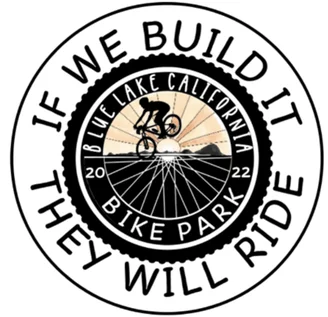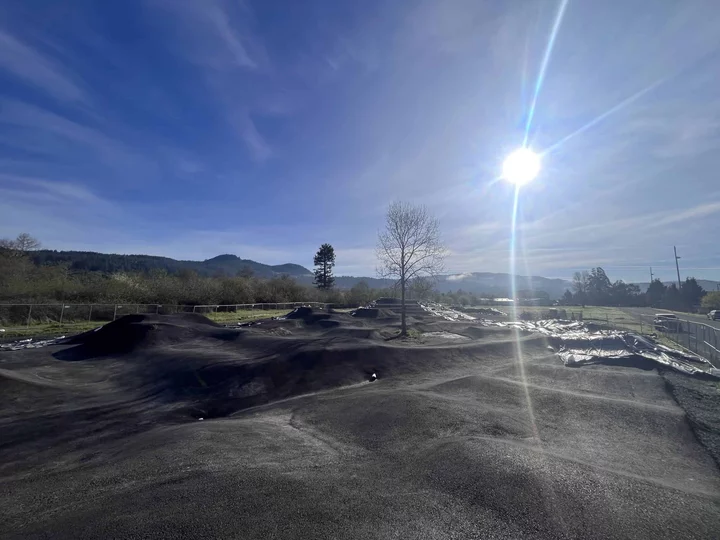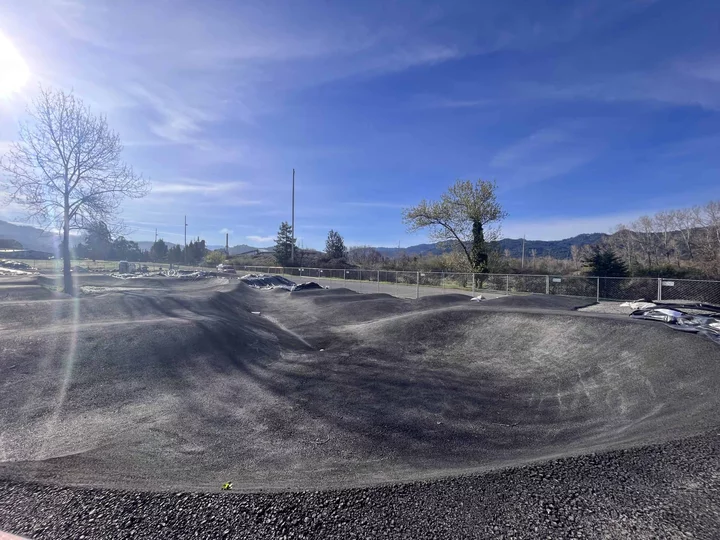UPDATE, June 4, 7:37 a.m.:
Yesterday evening, Blue Lake Mayor John Sawatzky emailed the following statement:
We are currently reviewing this project; as others have stated the project has gone beyond its original scope of work. We want to make sure the City as well as RCMBA are not negatively impacted by any over promises or under compensated for work rendered. My goal is to bring this amazing project to fruition and to thank those who have already put so much time money and effort into this project.
The city will definitely benefit from this community driven project. It’s really these amazing community initiatives that continue to keep small towns like Blue Lake alive and thriving.
###
Original post:
The freshly paved slopes of the partially finished Blue Lake Bike and Skate Park, located on a former lumber mill site on Taylor Way. | Photos via City of Blue Lake.
###
Over the past couple of months, the Blue Lake City Council has been closely scrutinizing the city’s involvement in the partially completed bike and skate park on Taylor Way, and last week the council formed an ad hoc committee to explore the matter further.
The project, which has been developed into an undulating expanse of pavement on a former lumber mill property donated owned by the city, has been built in stages over the last few years, almost entirely through donations and volunteer labor organized via a collaboration between the city, the Redwood Coast Mountain Bike Association (RCMBA) and the Humboldt Skatepark Collective.
The current iteration of Blue Lake’s city council is going over previously made decisions with a fine-tooth comb — see the city’s housing element update, for example — and now it wants more details about the city’s financial involvement in the park, the project’s approval history, potential insurance liability and more.
The council members — particularly Kat Napier, Elise Scafani and Mayor John Sawatzky — have stressed that they’re not opposed to the new park, which has been positioned as a potential recreation attraction and economic driver for this small city. But their increased scrutiny has made park supporters nervous nonetheless.

A logo for the bike park from the City of Blue Lake website.
RCMBA Director Gina Bauer said her organization funded the initial conceptual design and plan, which called for a pump track similar to the one at Fortuna’s Newburg Park. But community involvement and enthusiasm, along with financial support from local businesses, inspired an expansion in scope.
“COVID happened and the [existing bike] trails in Blue Lake took off,” Bauer said. “Our popularity and membership increased, and pretty soon other folks started paying attention [to the park plans].”
The 2022 version of Blue Lake’s city council — along with former City Manager Amanda “Mandy” Mager — wanted to expand the park into something larger, with areas for kids, skateboarders, BMXers and mountain bikers, amateur and expert alike. “They took the bull by the horns,” Bauer said.
Dana Creech, an ATV and motocross racer turned contractor, was retained to do much of the construction and paving. Tavis Cain, the owner of Blue Lake-based B&B Portable Toilets, got the project started and has been its biggest financial investor, according to Creech, who said the park has grown into something truly special.
“It’s its own kind of beast,” he said. “We ended up making it a way better project than it originally started as. People will come from all over the country, and possibly out of the country, to ride here. There’s nothing like this in the world.”
What makes it special, he said, is that the entire park is rideable in all directions, whereas most bike and skate parks have set routes with a few ramps along the way. “Instead of five jump lines, there’s 500,” Creech said of the Blue Lake park. “And you can ride it on a bike, a skateboard, roller skates, anything with wheels. It’s all rideable. And small kids can ride over the entire park.”
The pump track has yet to be built, but the plan is to have it circle the perimeter of the existing paved area. There’s a wish list of other amenities, including a half pipe, landscaping, shade structures, bathrooms and drinking fountains. With donations continuing to roll in, the park appears to be on the downslope toward completion, but the city council is now pumping the brakes — at least on the city’s own involvement.
In April, before the council reached a separation agreement with Mager, they asked for a project report, including city revenues and expenditures to date, the park’s approximate percentage of completion, its expected completion date and a rundown of city staff and resource expenditures.
Mager, who, whether she knew it or not, was attending her final regular council meeting, ran down some of the park’s history, including a Clean California grant request approved by the prior council in May of 2023. (The request was not awarded.) She also outlined the park’s key role in the city’s development plans for the Powers Creek District, plans which also call for industrial growth and a mixed-use affordable housing development. (See pages 40-49 in this agenda packet for details on the park portion of the plan.)
According to that report, Blue Lake has spent about $2,000 in recreation funds to support the development of the park, and staff has spent time writing grant proposals and organizing volunteer work days, with their time factored into the budget under “facilities and general recreation.”
Sawatzky questioned whether the city council ever officially authorized the development of the park. Mager said that it certainly had, though she couldn’t say exactly when. She noted the council’s support as expressed in the May 2023 grant application, but Sawatzky said his impression was that council support for the park was contingent on getting that grant.
Scafani asked for documentation.
“It would be helpful if you could show us the agenda item from when the council said ‘go’,” she said. “That gives us a clean trail we can follow and track.”
Mager said the park has essentially been an unfunded project, with the city providing the land and dedicating some staff time while volunteers and donors did the heavy lifting.
“I honestly can’t believe how much has been accomplished just with volunteers and fundraising, without the city putting in a substantial amount of cash,” she said. “The park is big and really well developed. We’re on a clear path to get it completed.” She noted that the city brought in nearly $50,000 in sponsorships and helped to arrange donated time, material, equipment and people-power.
Mager also said the city wrote grant proposals for both Coast Central Credit Union and the Headwaters Fund but had not yet heard back on whether they’d be granted.
At last week’s city council meeting, the matter was again on the agenda, this time at the request of an unidentified community member. Sawatzky asked whether the city has an official memorandum of understanding, or MOU, with RCMBA. Interim City Manager Dani Burkhart said no, it does not.
Mayor Sawatzky also voiced concern about a $300,000 cost estimate for the park, a figure that has been tossed around without much context. (More on that below.)
Napier called for a much higher degree of documentation and accountability.
“This isn’t a kids’ lemonade stand; it’s a city government,” she said. “No matter how tiny we are and how well we know each other, it’s still a city government, and there are certain things that bind us in what we do and how we interact, how we collect money, how we account for money.”
Napier argued that even if the money was being raised by an outside nonprofit organization such as RCMBA, there should be receipts for every dollar collected and documentation showing whether each donation was tax deductible or not, whether the use of those funds is restricted or not, etc.
“This isn’t a conversation about killing the bike park. It is not,” she insisted. “It is about accountability throughout the process.”
She suggested contracting with the city’s outside auditing firm, Jackson & Eklund, to conduct an investigation into the project’s financing, or possibly recommend someone who could.
Burkhart, who was in her first regular council meeting as acting city manager, said that while the city tracks every dollar it spends on the park, she cannot track the financial operations of a nonprofit organization, which is bound only to comply with its tax-exempt 501(c)(3) charter.
Napier said the city shouldn’t be satisfied with that. “They’re fundraising in the name of the City of Blue Lake. … ,” she said. “The city can require that transparency … and we should by way of a memorandum of understanding.”
Ultimately, the council agreed to form an ad hoc committee to investigate further. Sawatzky and Councilmember Michelle Lewis-Lusso volunteered to serve on the committee.
Reached by phone on Monday, Creech said he’s the one who tossed out the $300,000 figure in the middle of a meeting, but he’s now confident that the actual cost of completing the park will be far lower. And any excess money raised can be rolled forward to other projects, including one planned for Eureka’s McKay Community Forest.
As for liability insurance, Creech said he thought the city had that part figured out, and even if it hasn’t, other cities can likely explain how they handle such matters.
“We’re not reinventing the wheel,” he said, adding, “That’s not my side of it.”
Financial and material donations have come in from Mercer Fraser Company, JLG Construction, Schmidbauer Lumber and others.
Creech rattled off cost estimates for some of the big-ticket items needed to complete construction: $30,000 for asphalt (though organizers are hoping that might get donated); $25,000 for base rock; at least $80,000-$100,000 in labor — “I gotta eat, too,” he said, adding that if this project were put out to bid the price tag would likely be three times that much. He invited supporters to keep donating through RCMBA and the Humboldt Skatepark Collective.
Bauer said that, in the absence of an MOU with the city, RCMBA is effectively a project advocate trying to get it built. When Mercer Fraser brought in $18,000 worth of asphalt, she asked them to write off $5,000 worth as a donation to RCMBA.
“We’re trying to get creative,” she said. “We know the city’s not large. It’s not a big tax base, and we don’t want city to go broke.” The park has gotten this far thanks to individual and corporate donations, in-kind contributions and “lots of volunteer labor.”
Now it’s just a matter of getting it over the finish line.
“I think we can do that,” Bauer said.
When the Outpost reached Sawatzky via phone on Tuesday he said he was at work and didn’t have much time to comment. He mentioned the formation of the ad hoc committee and said, “Me and Michelle [Lewis-Lusso] have begun reviewing the bike park project.”
Another angle on the nearly completed park. | City of Blue Lake.


CLICK TO MANAGE